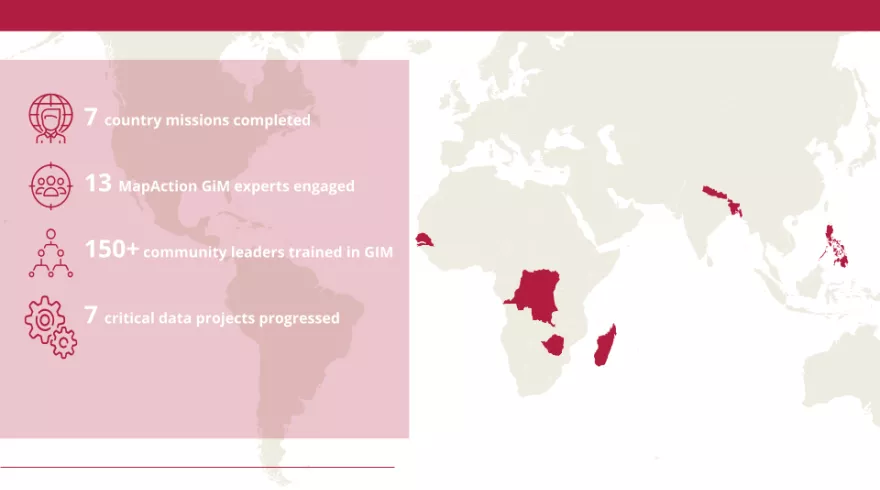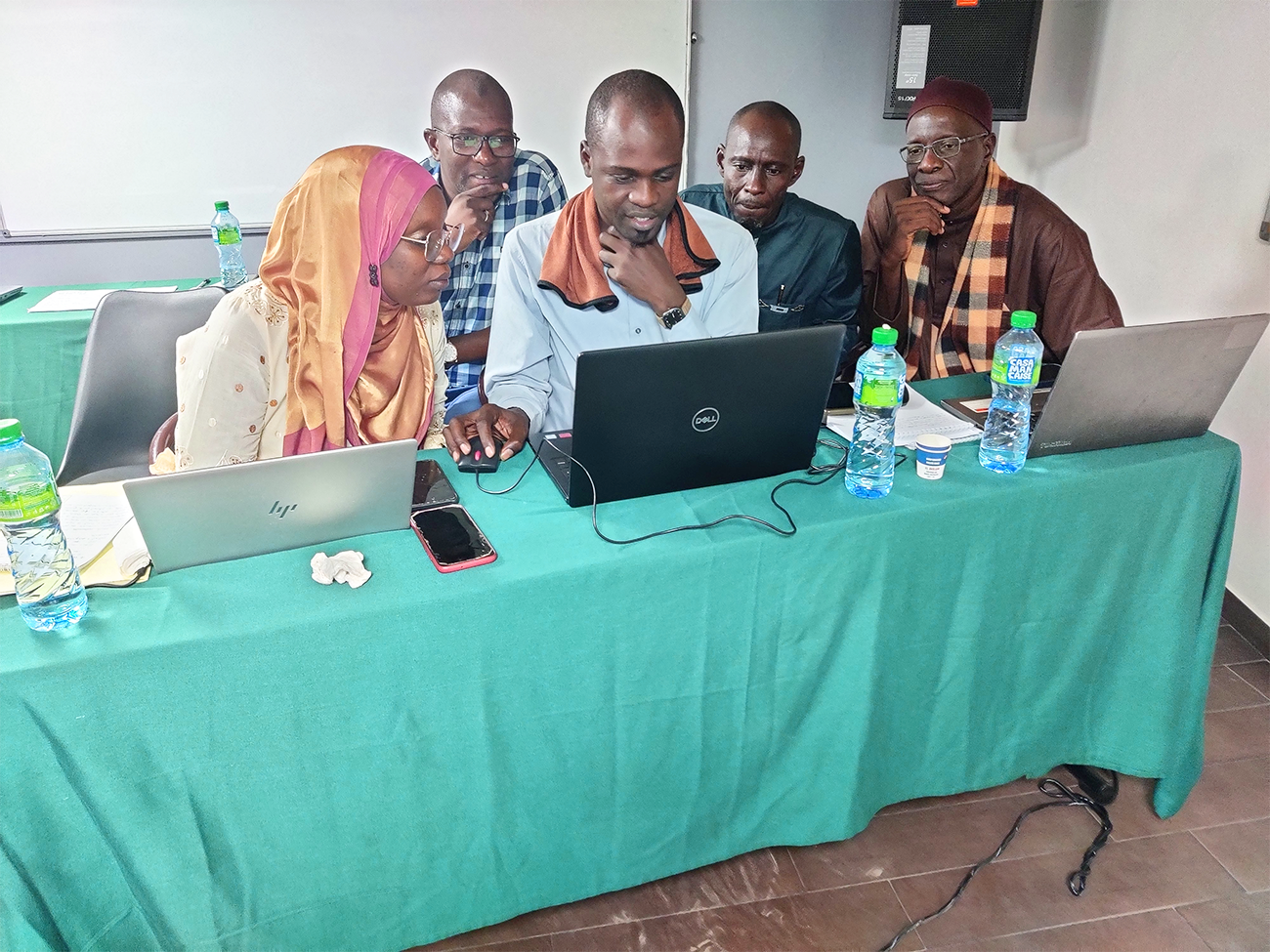London, 2 November, 2023: The Insurance Development Forum (IDF), a public-private partnership led by the insurance industry and co-chaired by the UN, the World Bank, and other international organisations, announces today the results of its Anticipatory Action (AA) and Disaster Risk Reduction (DRR) Initiative, in partnership with MapAction and Start Network.
As climate change threatens all countries, communities and people around the world, increased adaptation action as well as enhanced efforts to avert, minimise and address loss and damage are urgently needed to reduce and respond to increasing impacts, particularly for those who are least prepared for change and least able to recover from disasters[1].
Launched in 2021 to accelerate anticipatory action and risk reduction in seven crisis-vulnerable countries with the aim of reducing the impact of disasters on individuals and communities, Phase 1 of the AA and DRR programme delivered clear impacts, setting the stage for further ambition and scale in upcoming Phase 2.
The initiative also represents IDF’s and Start Network’s commitment to the Risk-informed Early Action Partnership (REAP), of which they are members, and is managed under the IDF’s Disaster Risk Reduction programme.

During Phase 1, MapAction and Start Network worked in close collaboration with local partners in Nepal, Bangladesh, the Philippines, Zimbabwe, the Democratic Republic of the Congo (DRC), Senegal, and Madagascar to build capacity, and break down both technical and process barriers in the use of GIM.
Building trust and exploring the GIM vista in each country has revealed a wide range of opportunities and enabled collaborative work to address tactical data issues that affect anticipatory action and DRR projects across these seven countries.
A significant part of the work undertaken in Phase 1 was the delivery of GIS training for AA and DRR professionals. This has been well received and there is keen appetite for further bespoke training. This effort is supported and funded by the IDF through seven member companies: Aon, AXA, AXIS, Milliman, Swiss Re Foundation, WTW, and Zurich Insurance.
The GIS training helps meet the information needs of local NGOs, supporting them to deliver effective humanitarian assistance after a disaster. For instance, this training has enabled access to insights into where frontline workers are needed most as they deliver help to communities, and where damaged roads or power failures may pose specific challenges to their work.
This and other relevant information, based on geospatial data, visualisation, and information management capabilities, is what NGO MapAction provides to enable critical planning and decision-making for Start Network’s local NGO partners. Supported and funded by IDF members, MapAction and Start Network work together to train humanitarian personnel in the use of geospatial and data technologies applied to humanitarian situations, to enable anticipatory action and disaster risk reduction measures.
Building on the success of Phase 1, the IDF, in partnership with MapAction and Start Network, are developing a proposed Phase 2 (2023-2025), which aims to further strengthen long-term crisis resilience and anticipatory action.
Support for the Anticipatory Action and Disaster Risk Reduction Initiative, to help anticipate, prepare for and respond to humanitarian emergencies, was one of the first actions of the IDF’s Disaster Risk Reduction programme. Phase 1 of the initiative has shown clear benefits and emphasised the importance of high-quality data, effective data curation, and the development of skills at the local level to interpret and visualise geospatial information. I want to thank MapAction and Start Network, as well as the local partners, for their engagement and support in this significant DRR implementation. By breaking down technical and process barriers in Geospatial Information Management, MapAction and Start Network have paved the way for more effective humanitarian decision-making in vulnerable countries.M. Liès, Insurance Development Forum Chair, and Chairman of Zurich Insurance Group
Unfortunately only a very small percentage of global funding for humanitarian response is allocated to anticipatory action programmes. Partnerships like this one with the Insurance Development Forum show the role that corporations and Public Private Partnerships can play however in contributing to sustainable early warning work. Anticipatory action is vital to ensure that communities worldwide are more resilient to future hazards.Colin Rogers, MapAction CEO
Start Network and MapAction have cultivated a relationship over the past couple of years that has become invaluable to us. Members of our network have been enthusiastic about the training received to date and are already using it to improve humanitarian action in emergencies, particularly in Nepal where colleagues have demonstrated increased confidence in developing maps through QGIS. There is clear scope for continued engagement, and colleagues are full of ideas about how MapAction’s expertise can strengthen anticipatory humanitarian action through Start Network’s financing mechanisms.Milli Cooper, Technical Partnerships Advisor (Crisis Anticipation and Risk Financing)
[1] Key finding 9 of the United Nation’s first Global Stocktake report since the 2015 Paris Agreement, released in September 2023
Notes to Editors
About the IDF
The Insurance Development Forum (IDF) is a public-private partnership led by the insurance industry and supported by international organisations, including the United Nations and the World Bank.
It was established to facilitate and support the growth and development of insurance-related resources and capabilities to help achieve the objectives of the Sustainable Development Goals (SDGs) and related United Nations (UN) Agreements, collectively herein known as the U.N. Global 2030 Agenda.
The IDF aims to optimise and extend the use of insurance and its related risk management capabilities to build greater resilience and protection for people, communities, businesses, and public institutions that are vulnerable to disasters and their associated economic shocks.
Through its broad membership of insurance sector, governmental and other international institutions, the IDF enables:
- The optimal coordination of insurance-related activities;
- The development of shared priorities;
- The mobilisation of resources;
- The promotion of strategic and operational relationships within and between governments, industry, and international institutions; and
- Safeguards the integrity and effectiveness of joint efforts and collective resources.
For more information please visit: www.insdevforum.org
About MapAction
MapAction is a humanitarian organisation working worldwide to ensure that maps and data are available to key decision makers to get the right aid to the right places when it is needed most.
Always seeking ways to improve the availability and use of geospatial and relevant data, MapAction also trains humanitarian personnel in the use of geospatial and data techniques and technologies, and increasingly works on anticipatory action. MapAction believes that applying geospatial and data expertise to humanitarian situations can greatly improve outcomes for the people affected. Around 80% of MapAction’s personnel are expert technical volunteers.
As well as helping countries, organisations and responders to prepare for humanitarian emergencies in advance, MapAction’s team is ready to respond in-country, remotely or both, to anywhere in the world. MapAction is independent and relies upon a combination of grants and donations to do its work.
For more information, please visit www.mapaction.org
About the Risk-informed Early Action Partnership
Launched at the UN Climate Action Summit in September 2019, the Risk-informed Early Action Partnership (REAP) brings together an unprecedented range of stakeholders across the climate, humanitarian and development communities with the aim of making 1 billion people safer from disaster by 2025. It aims to mobilise commitments and inspire action to scale up the use of anticipatory approaches, driving a systemic shift towards acting earlier to reduce the impacts of disasters.
For more information, please visit: https://www.early-action-reap.org/
PR Contacts
Helen Wright
Lysander PR
07842 729 579
Steve Colton
Lysander PR
07554 889 056

